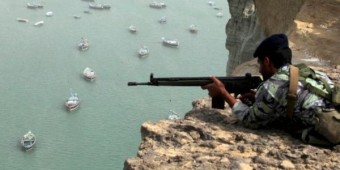Chief of Staff of Iran’s Armed Forces Major General Hassan Firouzabali said that military plans have been drawn up to close the Strait of Hormuz in the Persian Gulf, but added Iranian forces won’t shut it down until they receive the go-ahead from Iran Supreme Leader Ayatollah Ali Hosseini Khamenei.
In addition to drawing up plans for the strait’s closure and awaiting permission from Iran’s supreme leader, the Iranian Parliament, or Majlis, still needs to give final approval.
Earlier this month, the National Security and Foreign Policy Commission of the Iranian Parliament drafted a bill requiring the government to stop all oil tankers shipping to those countries that support sanctions imposed by the United States and the European Union against Iran’s oil sales.

Senior lawmaker Javad Karimi Qoddousi outlined some of the draft law’s provisions: “Based on the draft bill, the closure of the Strait of Hormuz will continue until the annulment of all the sanctions imposed against Iran, and the government will be allowed to open the strait only after meeting 14 conditions.”
He said the legislation also includes imposing a three-percent tariff on ships carrying other cargos destined for oil-importing countries, such as the U.S. and E.U. countries that support sanctions against Iran.
The tariff, he said, will be one of the conditions for opening the waterway to those countries’ oil tankers, and payment must be wired to Iran’s Central Bank, on which the West also has imposed sanctions.
Another Iranian lawmaker, Mehdi Moussavinejad, said that the draft legislation will be submitted to the parliament’s presiding board in late July to be put on the calendar for “double-urgency” consideration by all members of the Majilis.
This could mean that any final decision approved by the Majlis may not be forthcoming until late July, with Khamenei making a final decision by early August.
The Strait of Hormuz, situated between the Gulf of Oman and the Persian Gulf, is a narrow transit way for some 40 percent of the world’s oil production, including much of the crude oil pumped from the oil fields of Saudi Arabia.
In announcing military plans for the strait’s closure, Firouzabali dismissed claims made by Western countries that Iran cannot block the strait.
“They allege that we are bluffing is a bid to appease themselves,” Firouzabali said. “The armed forces have their own plans for every subject, but the decision to close the Strait of Hormuz lies on the Commander-in-Chief, Ayatollah Khameinei, who also receives consultations from the Supreme National Security Council.”
The U.S. Navy has assessed that Iran has the capability to block the strait, even temporarily, by sinking ships in the narrow transit channels, or by laying mines.
It also has a hard-to-detect “rocket mine” that’s set off by a distinctive magnetic or acoustic signature of a ship. Once a ship, such as a U.S. aircraft carrier, is detected, Iranian sources say, it then launches a propelled, 600-pound warhead at it.
Another is a Russian MDM6, which lies on the seabed and fires a torpedo-like warhead when it senses a vessel. It, too, is difficult to detect and can launch against multiple targets.
Both of these types of undersea mines are launched by Iran’s Russian-built Kilo-class submarines, according to sources.
In addition, sources say, the Iranians intend to use “swarm” tactics of heavily armed hit-and-run speed boats, which can be equipped with torpedoes, such as the super-cavitating Russian Skhval, which can travel a reported 250 kilometers an hour. At present, there is no defense against it.
The Iranians also have their own version of the Skhval, called the Hoot.
Iran has ratcheted up its rhetoric on closure of the strait since even more stringent U.S. and E.U. sanctions went into effect July 1 against Iranian oil imports in response to failure to reach agreement on Iran’s nuclear program, despite numerous international meetings.
Meanwhile, Israel has threatened to bomb Iran’s nuclear sites if it doesn’t halt its enrichment efforts, should sanctions and diplomatic discussions fail.
The West believes Iran’s nuclear program is a cover for developing nuclear weapons, while the Iranians insist that as a signatory to the Nuclear Non-Proliferation Treaty and as a member of the International Atomic Energy Agency, it has a right to develop nuclear energy for peaceful purposes.
In addition, Iran said the West lacks any evidence that the Islamic republic is embarked on a nuclear weapons program.
F. Michael Maloof, staff writer for the WND/ G2Bulletin, is a former senior security policy analyst in the Office of the Secretary of Defense


Iran is a powerful country. And we know that America is unjustly Iran sanctions Iran has the right to close the Strait because of his financial straits.lose. In fact, Iran’s war with Israel and America bases around Iran and America and Europe to supply 40% of oil from the Strait of Hormuz. Iran’s leader can command tens of millions and millions of fans out of Iran and Iranian soldiers that Israel is the first work. And everyone knows that Iran is popular everywhere. Iran is a Shiite country and you do not know Shiite. America should take lessons from the war with Iraq and Iran for 8 years or more 100 times more powerful than it knows. It is a fact.
Imam Khamenei in front of my enemy, I will sacrifice my soul with pride